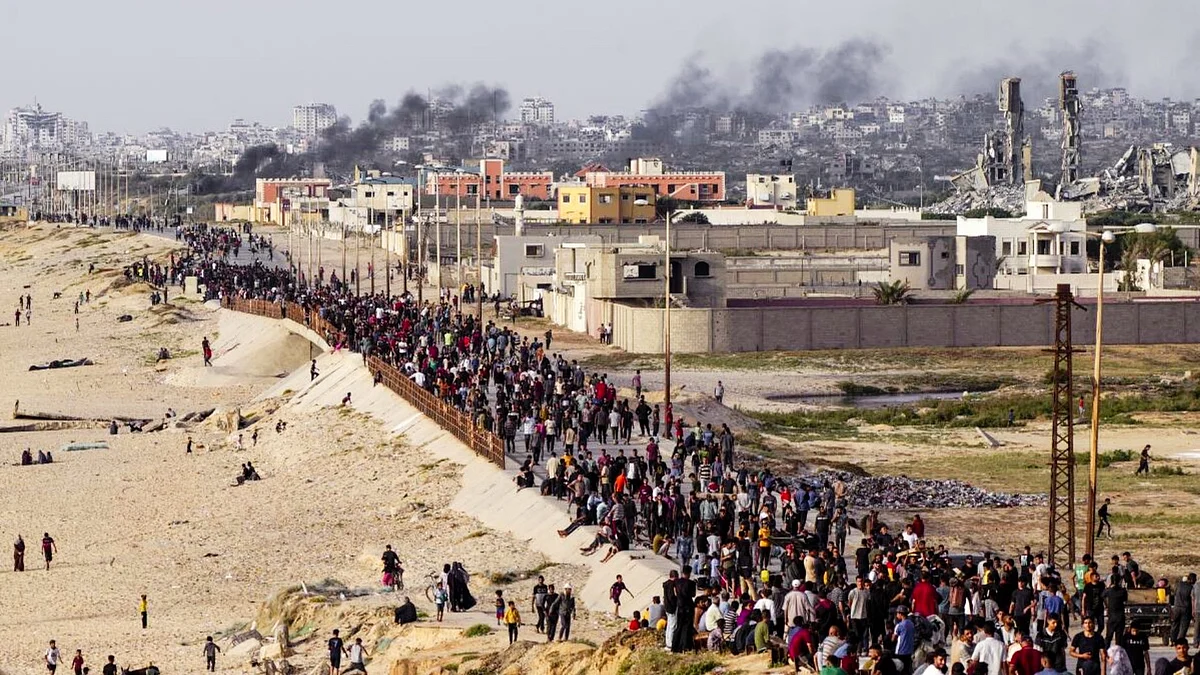Israel launches ground offensive in Gaza City as ceasefire prospects recede
Thousands of Palestinians flee with belongings piled on cars and trucks, but hundreds of thousands more remain trapped

The Israeli military on Tuesday began its long-anticipated ground offensive in Gaza City, closing in on the Palestinian territory’s largest urban centre after months of bombardment that has already reduced entire neighbourhoods to rubble. Thousands fled with belongings piled on cars and trucks, but hundreds of thousands more remain trapped.
The operation marks a new escalation in a conflict that has destabilised the Middle East for nearly two years and pushes prospects of a ceasefire further from reach. The army has given no timeline, though Israeli media suggest the campaign could last for months. Officials say the goal is to “destroy Hamas’ military infrastructure”.
The offensive coincided with a report by UN Human Rights Council experts accusing Israel of committing genocide in Gaza — an allegation Israel dismissed as “distorted and false”, defence minister Israel Katz declared “Gaza is burning” as heavy bombardment lit up the city overnight.
Mass flight from Gaza City
On Gaza’s coastal road, long convoys of vehicles carried families and their possessions out of the city. Some clung to truck roofs; others fled on foot. An Israeli military official, speaking anonymously, said the “main phase” of the operation had begun, with troops advancing from the outskirts toward the centre.
Before the offensive, Israel estimated 1 million Palestinians lived in Gaza City; some 350,000 have since left, while UN figures suggest more than 220,000 have fled northern Gaza in the past month alone.
Israel believes 2,000 to 3,000 Hamas fighters remain in Gaza City, hiding in tunnels and staging guerrilla-style attacks. By the operation’s end, Israeli forces aim to control nearly all of Gaza except for a swath along the coast, military graphics indicate.
Civilian deaths mount
By noon Tuesday, Gaza City’s Shifa Hospital had received 34 bodies from fresh strikes, said Dr Rami Mhanna, a hospital official. Dozens more wounded poured in.
“A very tough night in Gaza. The bombing did not stop for a single moment,” said Dr Mohamed Abu Selmiya, the hospital’s director. At the morgue, women wept over rows of body bags. “How long will we remain like this? We’ve had enough,” said Um Ahmed Zaqout. “Throw us into any country. Enough of this torture here.”
The Israeli army did not immediately comment but has long accused Hamas of embedding military infrastructure within civilian areas.
The war erupted on 7 October 2023, when Hamas-led militants stormed southern Israel, killing about 1,200 people, mostly civilians, and abducting 251. Forty-eight hostages remain in Gaza, fewer than half believed alive.
Israel’s retaliatory campaign has killed at least 64,900 Palestinians, according to Gaza’s health ministry. It does not distinguish between civilians and combatants, though it says women and children account for about half of the dead.
Families of hostages protest
As the offensive began, families of hostages gathered outside Prime Minister Benjamin Netanyahu’s residence, pleading for a halt. Some set up tents and slept outside.
“I have one interest — for this country to wake up and bring back my child along with 47 other hostages,” shouted Einav Zangauker, whose son Matan is being held in Gaza. “If he stops at nothing and sends our precious, brave soldiers to fight while our hostages are being used as human shields — he is not a worthy prime minister.”
Also Read: Israel–Palestine conflict: Words just fail!
Israel believes around 20 hostages, including Matan, are alive. Hamas has insisted it will only release them in exchange for Palestinian prisoners, a permanent ceasefire, and an Israeli withdrawal.
US pushes for talks
On a brief visit to Israel, US Secretary of State Marco Rubio warned of a “very short window of time in which a deal can happen” to end the war. “At some point, this has to end. At some point, Hamas has to be defanged, and we hope it can happen through a negotiation,” he said.
Rubio later travelled to Qatar, a key mediator in ceasefire efforts, where he met Emir Sheikh Tamim bin Hamad Al Thani. Qatar has been angered by an Israeli strike last week that killed five Hamas members and a local security official. Rubio thanked Qatar for its role but avoided directly addressing the strike.
Arab and Muslim leaders denounced Israel at a Monday summit but stopped short of concrete action, underscoring the difficulty of pressuring Israel to change course.
Egypt’s sharp warning
Egypt, long a mediator and the first Arab country to sign peace with Israel in 1979, has escalated its rhetoric. President Abdel-Fattah el-Sissi called Israel “an enemy” during the Qatar summit — the first time an Egyptian leader has used the term since diplomatic ties were established, according to Diaa Rashwan of Egypt’s State Information Service.
“El-Sissi’s ‘enemy’ comment played prominently across Egyptian newspapers,” Rashwan said on state TV, warning that “Egypt is being threatened”. Though Cairo has not altered its formal ties, the statement signals rising frustration with Israel’s conduct in Gaza.
With AP/PTI inputs
Follow us on: Facebook, Twitter, Google News, Instagram
Join our official telegram channel (@nationalherald) and stay updated with the latest headlines
